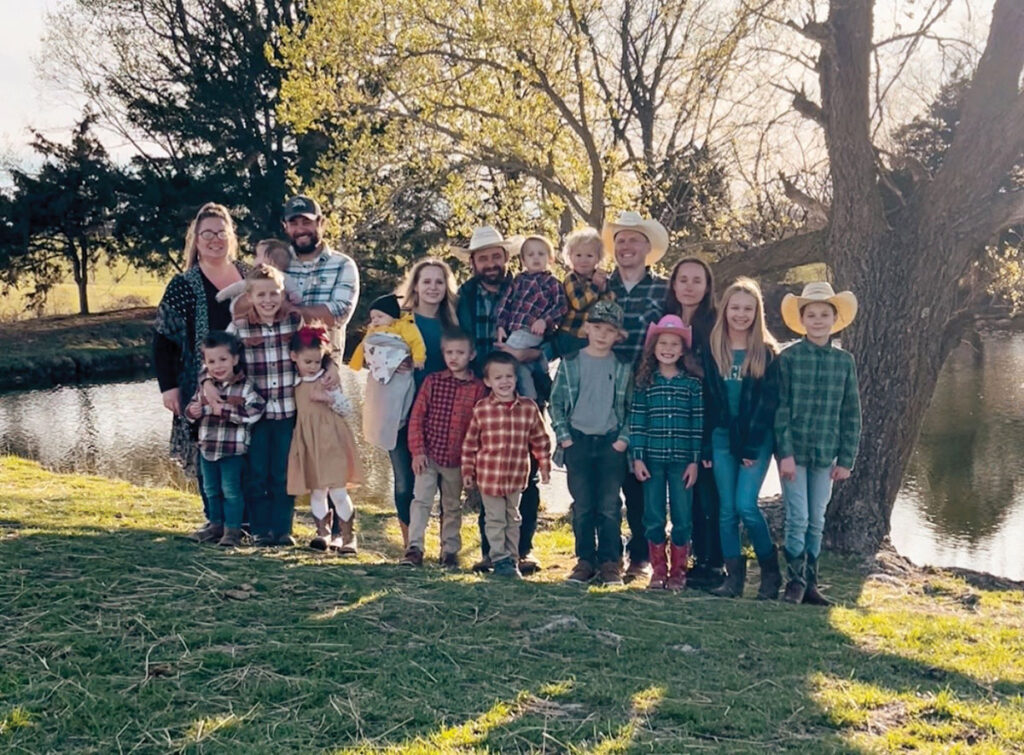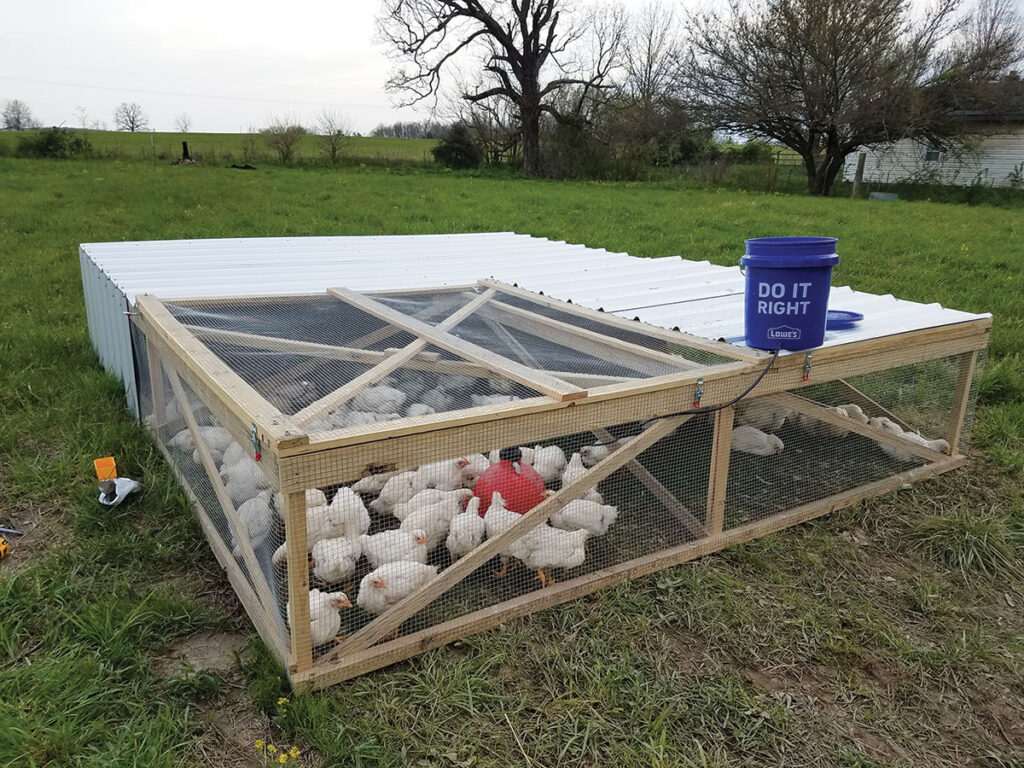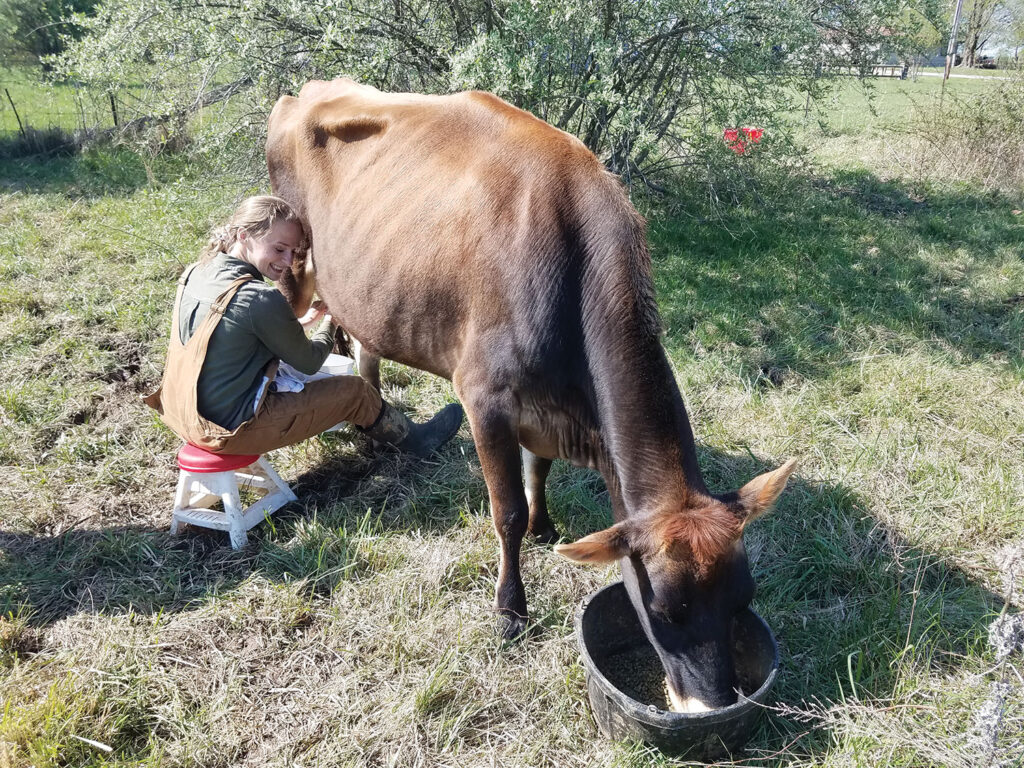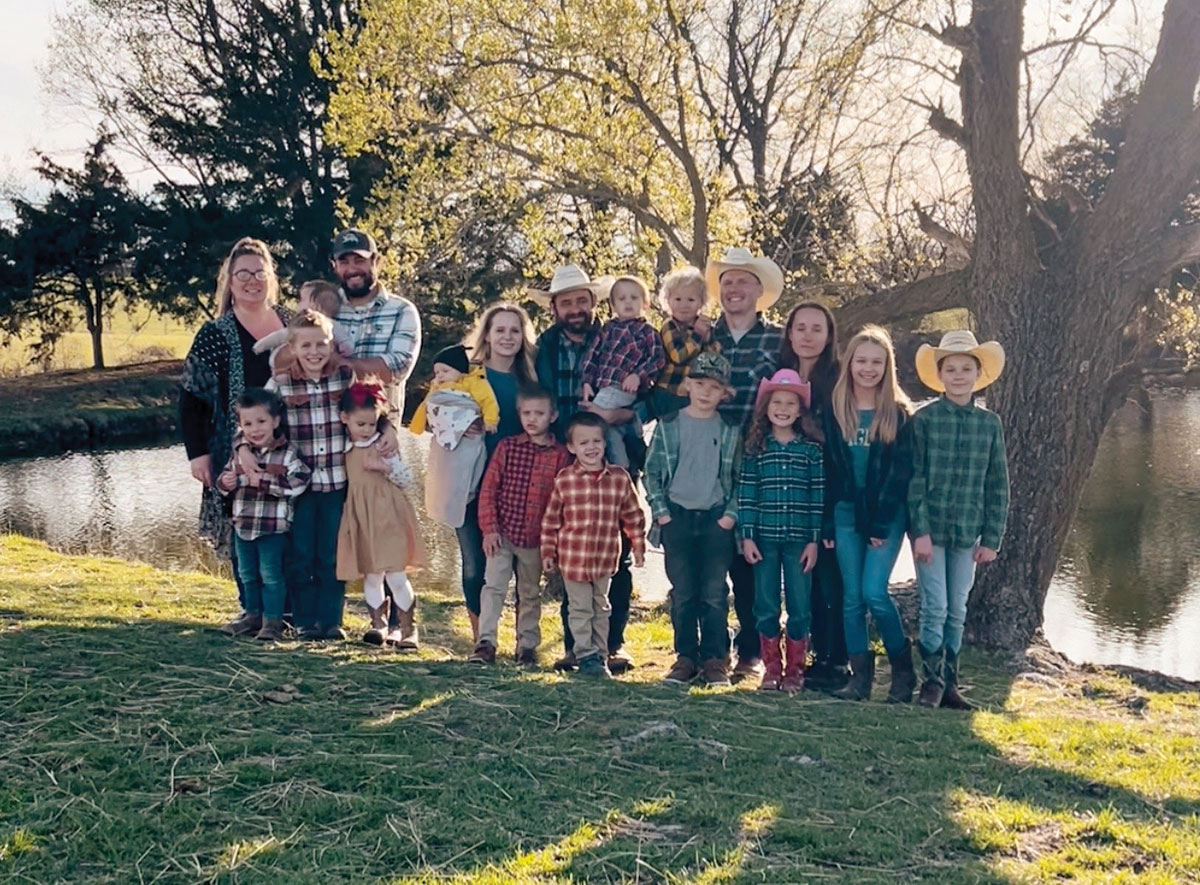
Small family farms join together to form Ozark Standard Farming Community
PHILLIPSBURG, MO. – What are the odds three families would relocate to the Ozarks around the same time, become neighbors, start small farms, and then partner in a farming cooperative? If the families have common goals, then the odds are good.
Cody and Anna Long, Vitaly and Dina Nikulin, and Mike and Tanya Chebotarev (Dina’s brother and sister-in-law), moved to Laclede County, Mo., within a couple of months of each other.
“The first time we all hung out, it was to butcher chickens,” Anna said with a laugh. “We were all raising chickens and wanted to start with cows and sheep. We all wanted to be self-sustainable and grow our own food, better food, for our families. We were doing the same things, so we threw it all together.”
The families started Ozark Standard Farming Community, a cooperative offering raw milk, chicken, eggs, turkey, pork and lamb.
“The whole idea of doing it together started because it’s hard to do it yourself,” Dina added. “For example, when we do a butchering day, we do it together and help each other; there’s not much strain. Also, if you have people of a like mind, it keeps you going.”
The Longs have 15 acres, the Nikulin family has 8, and the Chebotarevs have 10 acres. Now, entering their second year of the cooperative, the families primarily produce the same products and pool resources together when it comes time to market them.
While each family owns their farm and animals, they follow the same production practices and procedures.
The families also offer different products. For example, the Nikulin and Chebotarev families offer clients raw milk, and the Longs have meat rabbits. Dina is also hatching Plymouth Rocks hens to have eggs year-round. Roosters from the hatchings are sold as stewing chickens.
Customers preorder products from Ozark Standard Farming Community, and the couples take turns making weekly deliveries to Springfield.
“It makes it easier,” Dina said. “They come out, get their order, and you are done in less than half an hour.”
The cooperative also makes weekly deliveries to Lebanon and has on-the-farm sales.
The families plan to expand lamb sales this year and add Dexter beef and vegetables. Cody and Anna planted fruit trees on their property as well.
“We are trying to plan for the future,” Cody said.
With a background in her family bakery, Dina is also considering offering homemade bread.
“It’s easier to sell to 100 people than 1,000 people,” Cody said. “We want to get as much packed into those customers.”
“We have some good, loyal customers, and we want more customers like that,” Dina said. “We want to be a one-stop shop for all your farm-raised products. People appreciate those who do this because it’s what they like.”
Except for chickens and turkeys, all animals are processed upon customer request. The couples prefer to raise animals from start to finish so they know exactly where they came from.
“When I started to hatch chicks, I had a lower death rate than if I had bought them from a hatchery,” Dina added.
All animals are pasture-based. By utilizing rotational systems on their farms, the families can better use their land, and the daily rotation of the animals helps improve the quality of forages and increases soil fertility.

“We don’t use any chemicals and try not to worm anything,” Cody said.
Cody and Anna came to the region from South Bend, Ind. Cody’s parents live in the Marshfield area. The move to the Ozarks brought them closer to family and their desired quality of life.
Vitaly, Dina, Mike and Tanya are from Spokane, Wash., and opted for the Ozarks because of soil quality and land prices.
The couples explained that farm-to-plate products are heavily regulated in their home states. In Indiana, Anna said, raw milk may not be sold for human consumption.

“There is just a little more freedom here, which makes it good for the consumer,” Dina said.
Ozark Standard follows organic practices, but the farms are not certified organic.
“We want less red tape,” Cody said. “If customers want to come out and see how things are raised, they are welcome; we aren’t embarrassed about anything. Consumers want to know where their food comes from and how it was raised more than ever. They want that more than it just being organic.”
The couples also want to provide their growing broods with foods raised in a natural, organic environment.
“It’s getting harder and harder to eat clean,” Dina said, adding that organic selections at local grocery stores, including larger chains, are limited. “There are people out there who want to eat right, even for health reasons. We got a family cow because one of our sons can’t drink store-bought milk; he loves it. We got our Jersey cow, and he can drink as much as he wants.
“We do this for health reasons, and for our families, but in the process of making it affordable for us, we are offering it to people who want this lifestyle. Being able to provide our weekly deliveries makes our client base larger because they don’t have to go find it.”
The families are not only new to the Ozarks but to farming as well.
“We got here and just bought a whole bunch of stuff,” Dina said with a laugh. “We got here in December, and by February, we had bought a whole bunch of animals. We bought a cow, bulls (bottle calves) and chickens, but we didn’t know what we were doing. We got excited about the land and farming.”
The Longs came to the area to become more self-sufficient and raise their children in a rural setting but did not jump in feet first like their partners.
“We got four chickens,” Cody said with a laugh. “We started a little more slowly.”
Ozark Standard Farming Community would also like to add producers who follow the same methodology.
“Right now, the big thing is that we are able to take care of the customers we sell to, so we would have to add customers to add farms,” Cody said.
“We want everyone to be profitable,” Anna added.
“We have people reach out to us and say they are a small farm, too,” Dina said. “We have people reaching out who do different things, but until we have a higher demand, we can’t add anyone. We’re hoping to expand towards the end of the summer. Before we do that, we want to go to their farms and make sure we are all on the same page.
“When I advertise someone else’s products, I want to be confident in it. I want to know what’s going on at their farm; that way, I can say with confidence how it was raised. If we don’t have standards, then people can raise it however they want to raise it. Then what’s the difference between us and the store?”
Rhonda and Richard Peters, Anna’s grandparents, also live on the Long farm, helping where they can and serving as wranglers for the families’ broods, totaling 13.
“They do all the work, and we just say attaboy,” Rhonda said with a laugh. Rhonda is also the in-house chef, food critic, pitmaster and cheerleader.
“The difference in taste and texture; it’s huge,” she said. “When you get chicks from them, the fat is yellow. If you get one from the store, it’s what. What did this eat, and what did this eat? The turkey is huge and will fill up my smoker. I’m also a big lamb fan. I did a quarter of a lamb on the smoker, and it was the best lamb I have ever tasted in my life.”
As winter gives way to spring, the families say they will get into their busy season, which will continue through fall. They also have great hopes for 2024 and hope the spring showers bring more than flowers.
“We have only farmed during droughts,” Cody said with a laugh. “We’ve done OK, but it’s been tough.”







